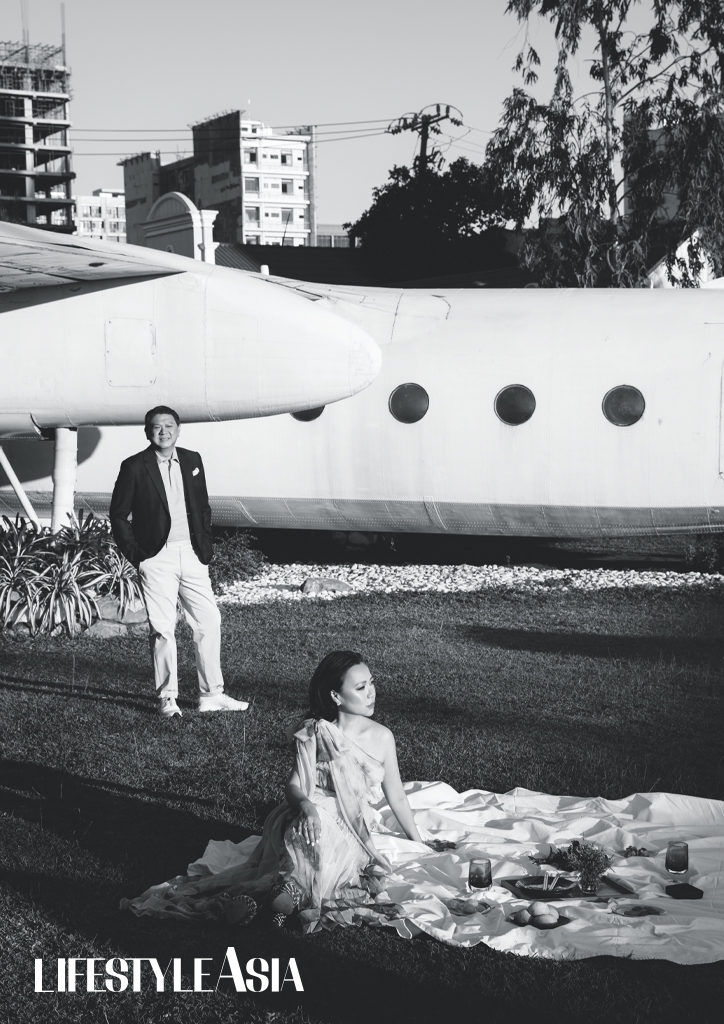The power couple behind Foodee Global Concepts, Rikki and Beng Dee on their undeniable talent in discovering world-class flavors, growing successful food brands and concepts, and elevating the Filipinos’ discerning taste for superb dining experiences.
The three-hectare estate of Palacio de Memoria provided the perfect backdrop for this handsome pair of successful entrepreneurs, while the sunlit clouds drifting across a clear blue sky enhanced the scene. It was a relatively warm morning. The day’s dignified personages, Rikki and Beng Dee, visionaries behind Foodee Global Concepts, begin by inviting the entire Lifestyle Asia team to join them in a fantastic brunch feast set up by their catering team. On the buffet menu, was a variety of appetizing textures and flavors—among many things, a local take on paella that makes use of adobo rice, fried egg, and tapa; succulent steamed fish; huge servings of prawn thermidor; and a selection of sophisticated Pinoy delicacies for dessert. Inside the gentrified pre-war mansion amongst rare and exquisite antiquities, paintings, and objets d’arts, the conversation started over everyone’s growing fear of that morning’s biggest newsmaker, the coronavirus disease (COVID-19). The previous evening, tensions rose as the government prepared for a lockdown. Beng expresses her genuine sympathies to those who will be deeply affected by the huge impact of the necessary mandate. “A lot of employees reside outside Manila,” she states. Rikki shares his wife’s sentiments, explaining the ominous repercussions of such a move to the national economy and the general welfare of the country’s citizens. Every now and then, you’d see the couple talking to their team, checking on their situation, and offering sound advice. Even with a large empire such as theirs, the sense of belonging and the sincere compassion for the plight of the workforce gives the impression that the two regard their massive team as integral parts of their family.

The Epicure’s Origins
One can easily surmise that the business-minded luminaries learned the basics, of traversing a difficult path in the ever-changing business landscape of the Philippines, from their parents. But technical skills and practical knowledge aside, honing one’s craft stems from a deep understanding and natural desire for food and the experiences that come along with it. Throughout this dialogue, Rikki’s admirable confidence and sharp as a tack wit complemented by Beng’s thoughtful insights and genuine enthusiasm, leave a good impression. The couple surely knows a lot about food.
“If people have to live by eating, I live to eat. I just love eating. I like exploring. So, I live to eat,” Rikki shares, when asked about their relationship with food. Beng confirms, “Food is inherent in our lives. Food for us is life.” Like many epicurean enthusiasts, the concept of food goes far beyond mere sustenance for the two. Rikki admits that he doesn’t have the same kitchen skills as his wife, who he completely adores. Proudly sharing that while she knows the basics, she has also learned a great deal from her mother and her mother-in-law—inheriting recipes of family specialties passed on from generation to generation.
Enchanting us with fascinating tales of his younger years, Rikki lets us in the Dee household from decades ago. “We stayed at our grandparents early on,” he recalls. “We always have feasts in the house, because we’re a big family with seven siblings, my grandparents, and my parents. We have a lot of recipes passed on for generations, and you don’t see those in restaurants. So, I guess the family’s influence on the taste bud was what drove me to get into the food business.”
RELATED READS: Wagyu Wonder: Beng Dee Shares All About Her Family’s Yakiniku Night

Cooking up a Storm
“When we started, we were never into franchising. Everything was our own concept. It takes us months to come up with a concept—the menu planning, the tasting, and the pricing.” Rikki tells me. Fastidious in conceptualizing all their outlets, Rikki and Beng ensure that everything that comes out of their kitchens is of good quality. “For about thirty years, we’ve been doing that all along with multiple brands,” he says. With a fast-growing dining scene, Manila continues to offer new concepts month after month. Hence, the task of putting out something fresh and different gets more difficult and challenging as time goes by.
Rikki gamely reveals some tricks up his sleeve, “For local brands, we try to look at the gaps and availability in the market. That is hard to find. We used to do whatever we feel like doing. But after those years that we’ve done that, today, we try to find a niche—a gap in the market. Our Product Development Group constantly meets every month and we try to study the bestsellers in the industry now and what the trends are. Hard to do, but we try to fix it.” His formula became a surefire success for their then-budding company. By bringing in never-seen-before ideas, Foodee Global Concepts became a benchmark of success in the industry—setting trends instead of following them.
In recent years, Foodee Global Concepts brought in several international brands to the country as a response to rapid globalization. But there is no single factor in their choices. The Dees are quite meticulous. Rikki explains, I’m going to franchise, even if you have a Michelin star and even if you’re good, I won’t do it—because we can also do it. We now franchise only when there’s brand recollection. Brand recall is very powerful.”

A Palate for Pinoy Food
The Dees note that Filipinos, like the rest of its Asian counterparts, serve great comfort food. “Filipino food will always be more than 50% of our food cravings,” Rikki says. “Filipino food, you can do nationwide. You can do from high end to the lowest end. High end, maybe a little. But from low end to casual dining, everywhere.” Beng notes how internationally-recognized
gourmands are also impressed with our local dishes, “The late Andrew Bourdain said, ‘The next big thing will be Filipino food’. Andrew Zimmern, a very famous TV host, also said, ‘This (Filipino food) is the most undervalued food in the world.’”
Introducing Filipino cuisine to the global market has been an uphill climb. Particularly because similar to its palate, foreign eyes are also discerning when it comes to food. “We’ve been fighting for it for the longest time,” Rikki says, expressing concern. “Five years ago, a group of culinarians who thought of making Filipino food regional and globally acceptable. So they brainstormed. In fact, they came out with a book—Kulinarya. So the group posed the question, ‘What are the pros and cons of Filipino food?’ Number one, the color of our food. Our colors are too dark, too orange, too brown. Second, we serve the head and tail. We serve everything with bone. Europeans and Americans, they might have a hard time, just by looking at it. So, this group came out with a lot of items without tampering with the original recipe but redesigning it in such a way that it will be appealing
to international standards.”
“In the past few years, Filipinos are gaining ground in the US. These are set up by second generation or third generation Fil-Americans,” Beng discloses. “The new generations knew what was needed to do with our cuisine to be acceptable in a global perspective—a fresh, new look that is stylized, incorporating new trends in an innovative way of serving Pinoy food that would fit in with the palate of the global market.”
Read the full story written by Pipo Gonzales in Lifestyle Asia’s November 2020 issue titled, “Rising Together.”
Art Direction MARC PAGDILAO
Hair, Makeup & Grooming JAN EDROSOLAN
Styling ROKO ARCEO
Styling Assistant VINCENT CORIOSA
Sittings Editors DONG RONQUILLO, SARA SIGUION-REYNA
Shoot Coordination ALYANNA TIMOG
Shot on Location PALACIO DE MEMORIA
Special Thanks to KAI CATERING





